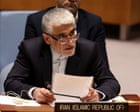
In recent developments surrounding international diplomacy and regional tensions, Iran has affirmed its unwavering commitment to its nuclear enrichment program, while geopolitical uncertainties continue to unfold in the Middle East. These events highlight the intricate interplay between international diplomatic efforts, regional security concerns, and the complex narratives of national interests.
Amir-Saeid Iravani, Iran’s ambassador to the United Nations, voiced that Iran’s nuclear enrichment program will persist unabated. Speaking firmly of Tehran’s stance, he emphasized that these activities are consistent with their rights under the Treaty on the Non-Proliferation of Nuclear Weapons. Iran insists on its right to peaceful nuclear energy and views any demand for cessation as an infringement on its sovereignty. “The enrichment is our right, an inalienable right, and we want to implement this right,” Iravani stated. In a gesture reflective of diplomatic willingness, he also asserted Iran’s readiness for negotiations, yet firmly rejected any notion of being cornered into what he described as an “unconditional surrender.” He characterized such demands as a dictatorial approach rather than genuine negotiation.
Meanwhile, the already volatile situation in Gaza City has seen a significant escalation. Tens of thousands of Palestinians have been forced to flee their homes in response to warnings from Israeli forces. The Israel Defense Forces announced plans for a major offensive in the region, urging citizens in eastern Gaza City to evacuate. The operation, as described by Israeli military communications, intends to “escalate, intensify, and extend westward to the city center,” targeting the capabilities of alleged terrorist organizations. This mass displacement adds another layer of humanitarian concern, with evacuees being directed to coastal areas that are themselves challenged by overcrowding and limited resources.
Adding to the complex geopolitical landscape, former U.S. President Donald Trump addressed leaked information from a U.S. intelligence report regarding the impact of recent American military strikes on Iran. Dismissing a leaked assessment that suggested the strikes only temporarily hampered Iran’s nuclear development, Trump reaffirmed his belief that the operations effectively disrupted Iranian facilities. He claimed that key stockpiles of enriched uranium had been targeted and destroyed, contrasting with Iranian claims that these materials had been relocated. Trump’s contemplation of legal actions against journalists involved in these leaks introduces another contentious element to the situation, positing potential challenges related to press freedom and national security.
These dynamics anchor the conversation around the delicate balance between national interests, regional peace, and global security. The ongoing discourse keeps stakeholders, both individual nations and international bodies, attentive to emerging negotiations and regional developments. The emphasis on diplomatic dialogue suggests pathways toward managing tensions, although differences in objectives and perceptions continue to pose challenges.
While Iran remains steadfast in its enrichment pursuits for peaceful purposes, the international community remains vigilant, balancing dialogue with preparedness. The situation in Gaza highlights the dire need for humanitarian responses alongside political resolutions. Concurrently, the narratives emanating from the United States and Iran reveal complexities in communication and trust that require careful navigation in pursuing peace and security in the region.
As these stories progress, they underscore the value of mindful and deliberate engagement to cultivate pathways for resolution and stabilization in geopolitically sensitive areas. Diplomacy, dialogue, and humanitarian considerations will continue to play crucial roles in shaping future developments. The focus remains on finding sustainable solutions that respect national sovereignty while ensuring regional and global peace.
Source: {link}
